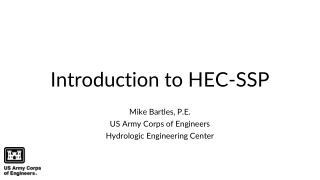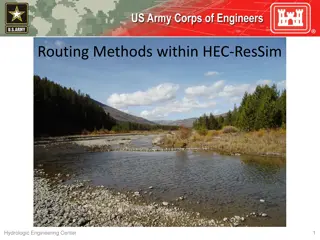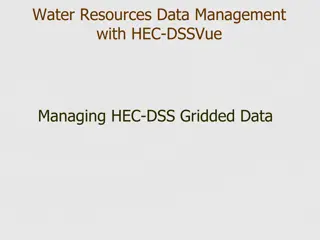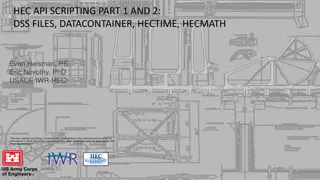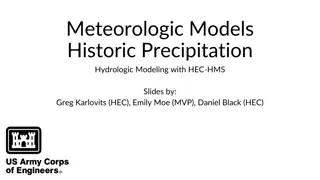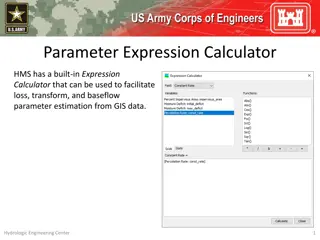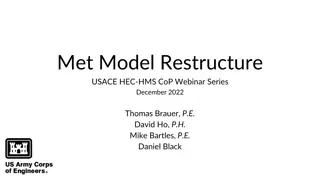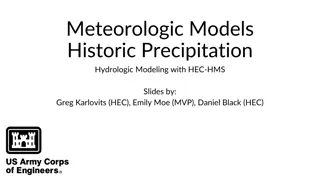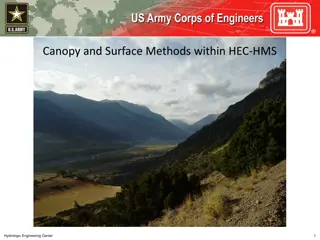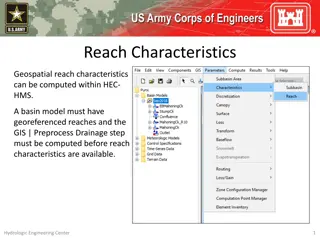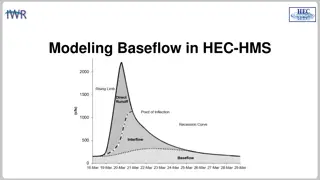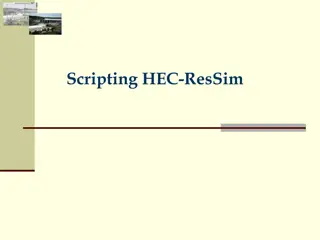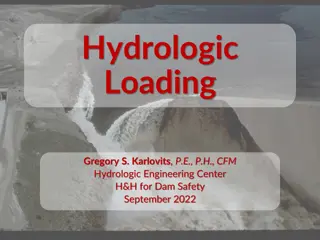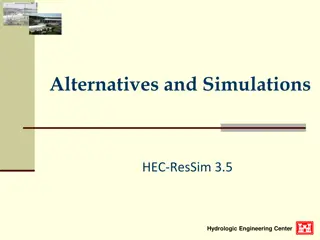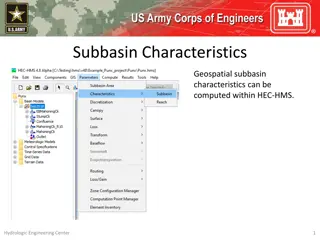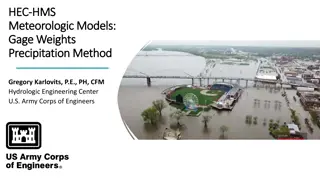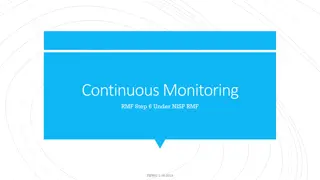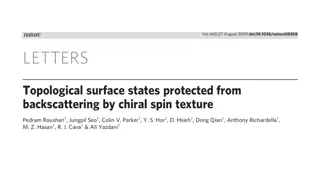Introduction to HEC-SSP
Explore the evolution and development of HEC-SSP, a software tool by the US Army Corps of Engineers, from its historical origins in the 1970s to its recent updates in analytical capabilities and user experience enhancements. Learn about the key team members behind the development and the new tools i
1 views • 52 slides
Hydrologic Modeling Methods in HEC-HMS: A Comprehensive Overview
Explore the transformative methods within HEC-HMS hydrologic modeling, including unit hydrograph derivation, excess precipitation transformation, hydrograph illustration, surface transform methods, and concepts like the kinematic wave and 2D diffusion wave. Learn about the unit hydrograph, kinematic
0 views • 41 slides
Center for Impact Finance Research - Overview
The Center for Impact Finance Research at Rothschild & Co focuses on conducting independent research to understand the impact of firms' non-financial performance on their financial performance, the role of finance in addressing current challenges, and methods to measure non-financial performance. Th
1 views • 11 slides
Introduction to Flood Risk Assessment with HEC-FDA Overview
This presentation delves into flood risk assessment using HEC-FDA software, covering topics such as defining flood risk, components of uncertainty, consequences of flood risk, and methods to assess flood risk including hydrology, hydraulics, geotechnical, and economics. It explores the intersection
6 views • 39 slides
Understanding Routing Methods in Hydrologic Engineering Center (HEC-ResSim)
Explore the differences between hydrologic and hydraulic routing, learn about open channel flow processes, and delve into channel routing within HEC-ResSim. Discover various reach routing methods, parameter estimation techniques, and calibration approaches. Dive into the Muskingum method and its app
6 views • 29 slides
Evolution of HEC-SSP Analytical Tools and Software Development Team
HEC-SSP, a software developed by the US Army Corps of Engineers, has evolved over the years to meet the statistical needs of the Corps. From its inception in FY2005 to the latest version, the software has seen significant enhancements in capabilities such as General Frequency, Curve Combination anal
9 views • 52 slides
Reservoir Storage-Yield Analyses Using HEC-ResSim Lecture #2
This lecture covers the theory of storage-yield analyses, focusing on understanding yield, types of yield like firm yield, methods to calculate yield, and the importance of storing water for re-distribution. It delves into within-year and over-year reservoir storage concepts, illustrating the minimu
7 views • 47 slides
Understanding Different Types of Scripts in HEC-ResSim
Explore the two main categories of scripts in HEC-ResSim - scripts executed outside simulations and scripts executed during simulations. Learn about the functions and properties of each type, including scripted rules and state variable scripts. Discover how these scripts compute flow limits, store m
6 views • 23 slides
Managing Water Resources Data with HEC-DSSVue
Learn about managing gridded data in HEC-DSSVue, including how grids represent spatial data, storing data in DSS, naming conventions, tools for manipulation, and more. Explore the importance of grids in hydrologic modeling and the application of spatial data in HEC-HMS and HEC-RAS.
4 views • 42 slides
Stochastic Storm Transposition in HEC-HMS: Modern Techniques and Applications
Explore the innovative methods and practical applications of Stochastic Storm Transposition (SST) in the context of HEC-HMS. Delve into the history, fundamentals, simulation procedures, and benefits of using SST for watershed-averaged precipitation frequency analysis. Learn about the non-parametric
3 views • 41 slides
GIS Data Management in Hydrologic Engineering Center (HEC) Software
Efficiently manage GIS data in HEC software by organizing background shapefiles, saving files in relevant directories, and utilizing relative pathnames. Understand the contents of basin files, GIS directories, and the step-by-step process involved in the delineation of elements within a project.
9 views • 5 slides
Overview of HEC API Scripting Part 1 and 2: DSS Files, DataContainer, HecTime, HecMath
This report delves into the HEC API scripting involving DSS files, DataContainer, HecTime, and HecMath. It covers important classes, accessing files, and the distinction between DataContainers and HecMath objects. Additionally, it compares Python and Java, highlighting their differences in interpret
2 views • 28 slides
Hydrologic Modeling with Gridded Precipitation Data
Learn about utilizing gridded precipitation data for hydrologic modeling with HEC-HMS. Explore the advantages of spatially distributed precipitation sources such as RADAR and gauge comparisons, and understand the various national and regional products available. Discover utilities for converting and
3 views • 14 slides
Parameter Expression Calculator for Efficient Parameter Estimation from GIS Data
Parameter Expression Calculator within HEC-HMS offers a convenient tool to estimate loss, transform, and baseflow parameters using GIS data. It includes various options such as Deficit and Constant Loss, Green and Ampt Transform, Mod Clark Transform, Clark Transform, S-Graph, and Linear Reservoir. U
2 views • 5 slides
Restructuring of USACE HEC-HMS Meteorologic Model
Significant modifications have been made to the HEC-HMS meteorologic model to enhance modeling tasks' ease and intuitiveness. The Met Model Restructure updates in versions 4.9 to 4.11 streamline meteorologic processes, introduce new features like automatic linkages and zonal editors for snowmelt, an
0 views • 19 slides
Historic Precipitation Hydrologic Modeling with HEC-HMS Slides by Greg Karlovits, Emily Moe, Daniel Black
Delve into the world of hydrologic modeling with HEC-HMS through a detailed presentation by experts Greg Karlovits, Emily Moe, and Daniel Black. Explore meteorologic models, atmospheric boundary conditions, basin modeling, and simulation runs in this informative slide series.
0 views • 12 slides
Understanding Canopy and Surface Methods in HEC-HMS
Explore the various canopy and surface methods utilized in HEC-HMS for managing water resources. Learn about canopy interception, evapotranspiration, common parameter values, and factors affecting losses. Delve into available methods, canopy storage values, and surface depression storage. Enhance yo
0 views • 12 slides
Understanding Reach Characteristics in HEC-HMS Basin Modeling
Reach characteristics play a crucial role in hydrological modeling using HEC-HMS. Georeferenced reaches are essential for computing reach characteristics like slope, sinuosity, relief, and more. The process involves pre-processing drainage data before detailed reach characteristics can be obtained.
0 views • 5 slides
Understanding Baseflow Modeling in HEC-HMS
Baseflow in HEC-HMS plays a crucial role in modeling runoff volume, consisting of groundwater flow components like interflow and baseflow. Different approaches are used to model baseflow, with HEC-HMS currently incorporating conceptual methods. The response times for interflow and baseflow differ, i
1 views • 7 slides
Understanding Scripting in HEC-ResSim
Explore the two categories of scripts in HEC-ResSim - executed outside simulations and during simulations. Learn about static scripts for pre-processing, running simulations, and post-processing, along with the tools like Script Selector and Script Editor for script execution and editing.
0 views • 34 slides
Understanding Hazard Curves in Dam Safety Risk Assessments
This content focuses on the role of hazard curves in dam safety risk assessments, emphasizing the level of effort required for their development and the use of HEC software. It highlights the three components of risk (hazard, performance, consequence), discusses hazardous loads and potential consequ
1 views • 58 slides
HEC-ResSim Alternatives and Simulations Overview
Explore the functionalities of HEC-ResSim including creating, composing, and setting up alternatives for hydrological engineering simulations. Learn about ResSim alternatives, simulation modules, and the alternative editor in detail.
0 views • 31 slides
Understanding Subbasin Characteristics in HEC-HMS
Subbasin characteristics play a crucial role in hydrological modeling within HEC-HMS. Before computing these characteristics, the basin model must have georeferenced subbasins in the GIS. Various parameters such as basin slope, relief, elongation ratio, drainage density, and flowpath lengths and slo
0 views • 13 slides
Understanding Gage Weights and Precipitation Methods in Hydrologic Modeling
Exploring the concept of gage weights and precipitation methods in hydrologic modeling using the HEC-HMS software. Dive into the pros and cons of flexible gage weighting, calibration processes, and best practices for estimating time and depth weights. Discover how to set up a gage weights model, inc
0 views • 11 slides
Understanding Continuous Monitoring in Risk Management Framework (RMF)
Explore the continuous monitoring process in the Risk Management Framework (RMF) under the NISP RMF FISWG. Learn about the six steps in the RMF process, DSS-provided RMF guidance, and an overview of RMF continuous monitoring strategies and security control families. Discover how to outline DSS RMF p
1 views • 25 slides
South Sudan FY 2018/19 Budget Resource Envelope Presentation
Hon. Salvatore Garang Mabiordit presents the FY 2018/19 Budget Resource Envelope to address discrepancies in oil data, highlighting an increased envelope of 79 billion SSP. Key areas include defaults, TFA payments, contingency fund, salaries arrears fund, non-oil revenue projections, and VAT collect
0 views • 10 slides
Sportshall Athletics Virtual Competition 2020/21 for Key Stage 1 Students
Explore how to enter and play in the Sportshall Athletics Virtual Competition for Key Stage 1 students organized by Amber Valley SSP. Submit scores for challenges, follow activity guidelines, and aim for awards like participation certificates and school accolades. Engage in activities like speed bou
0 views • 10 slides
Study Abroad Student Support Program - My SSP
My SSP offers 24/7 support for study abroad students to navigate challenges associated with studying in another country. Through the app or phone, students can connect with counselors who understand their unique experiences, providing assistance with everyday concerns and maintaining confidentiality
0 views • 9 slides
Fitness Moves at Durham and Chester-Le-Street SSP
Explore a variety of fitness moves at Durham and Chester-Le-Street SSP including on-the-spot sprints, high knees, butt kicks, and jumping jacks. Each exercise focuses on balance, posture, and engages different muscle groups. Options are provided to cater to different fitness levels and preferences,
0 views • 12 slides
Tag Rugby Virtual Competition 2020/21 for Year 3 & 4 Amber Valley SSP
Participate in the Tag Rugby Virtual Competition by submitting your top scores for challenges and following the provided scoring system. The event offers a chance for all students to engage in sport regardless of their usual participation. Schools can earn awards based on their leaderboard standings
0 views • 8 slides
UK Climate Resilience Programme Webinar Series 2021
The UK Climate Resilience Programme is hosting a webinar series featuring experts discussing climate resilience, adaptation strategies, and socio-economic pathways for the UK. Attendees can engage in presentations, Q&A sessions, and access recorded content post-event. Learn about the latest developm
0 views • 10 slides
Evolution of MECA JATS-Con: A Comprehensive Timeline
Delve into the historical evolution of MECA JATS-Con, tracing the journey from its inception in August 2016 to its presentation at SSP in June 2018. The working group's efforts, monthly meetings, and refinement processes culminated in the submission of specifications to NISO for standardization. Wit
0 views • 16 slides
SSP Maximize the value of your advertising inventory
SSP Platform for managing and administering advertising spaces on the web Purchase and offer of advertising Learn more here!
2 views • 10 slides
Surface Analysis of STM Bi0.92Sb0.08(111) with Spectroscopic Techniques
Explore the surface properties of STM Bi0.92Sb0.08(111) using advanced spectroscopic methods such as dI/dV mapping, QPI patterns, JDOS, SSP, Spin Selection Probability, ARPES, FT-STS, charge inhomogeneity, scattering of surface states, and spatial fluctuations of momentum. The images provide a detai
0 views • 10 slides
